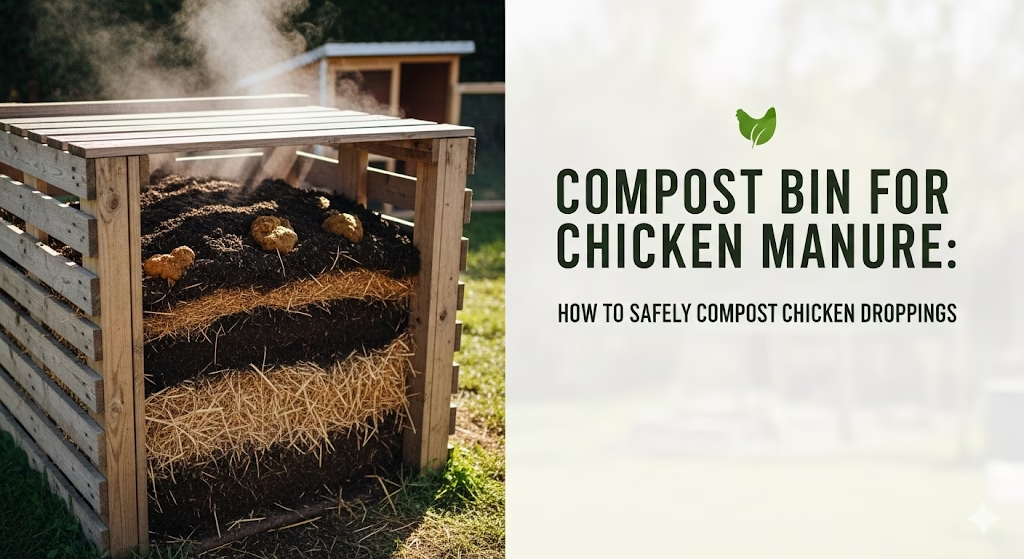Introduction
Backyard chickens are a fantastic source of fresh eggs—but they also produce a lot of manure. Chicken manure is highly nutrient-rich, but applying it fresh to your garden can burn plants and carry harmful bacteria.

A compost bin for chicken manure is the safest and most effective way to turn chicken droppings into nutrient-rich compost. This guide will cover how to compost chicken manure, the best types of compost bins, and tips to get the most out of your poultry waste.
Why You Need a Compost Bin for Chicken Manure
- Neutralizes “hot” nitrogen – Fresh droppings are very strong and can damage plants.
- Kills pathogens – Proper composting reduces Salmonella, E. coli, and other harmful bacteria (USDA Guide on Composting Animal Manure).
- Reduces odor – Composting produces an earthy smell instead of the strong ammonia odor of fresh manure.
- Recycles waste – Turns chicken droppings into a valuable fertilizer for vegetables, lawns, and flowers.
How to Compost Chicken Manure in a Bin
Step 1: Choose Your Bin
- Size: At least 3x3x3 feet for a small flock. Bigger bins are needed for larger flocks.
- Type: Plastic, wooden, or metal compost bins work. Ensure good ventilation.
- Access: Choose a bin with a lid and removable access panel for turning and harvesting compost.
Step 2: Collect Materials
- Chicken manure
- Bedding materials: straw, wood shavings, or dry leaves
- Optional: grass clippings, kitchen scraps (EPA on Composting Basics)
Step 3: Layer and Balance
- Ratio: 1 part chicken manure (green) to 2 parts bedding (brown).
- Layer manure and bedding in the bin to balance nitrogen and carbon.
Step 4: Maintain Your Pile
- Aeration: Turn the pile every 1–2 weeks to supply oxygen.
- Moisture: Keep it damp but not wet.
- Temperature: Ideal range 130–150°F (55–65°C) for pathogen reduction (Cornell Composting Guide)
Step 5: Curing
- Compost should cure for 6–9 months.
- Finished compost will be dark, crumbly, and earthy-smelling.
Types of Compost Bins for Chicken Manure
1. Tumbler Compost Bin
- Rotating design makes turning easier.
- Keeps compost contained and reduces odor.
2. Static Compost Bin
- Stationary bins made of wood, plastic, or metal.
- Larger capacity, great for medium flocks.
3. DIY Chicken Manure Bin
- Use pallets, wire mesh, or plastic barrels.
- Affordable and customizable.
4. Worm Composting Bin (Optional)
- Use worms (vermicomposting) with chicken manure and bedding.
- Produces nutrient-rich worm castings.
Tips for Using a Compost Bin with Chicken Manure
- Mix manure with bedding – Reduces odor and prevents nitrogen burn.
- Monitor temperature – Ensures pathogen kill.
- Use a lid – Protects compost from rain, pests, and excessive drying.
- Aerate often – Helps the pile break down faster and reduces smell.
- Wear gloves – Safety first when handling manure (CDC on Safe Handling of Manure)
How to Use Finished Chicken Manure Compost
- Vegetable gardens: Mix 1–2 inches into the top 6–8 inches of soil.
- Lawns: Spread a thin layer as top-dressing.
- Flower beds and shrubs: Apply around the base to boost growth.
- Container plants: Mix 1 part compost with 3 parts potting soil.
Best Chicken Manure Compost Bin Options
| Compost Bin Type | Best For | Pros | Cons |
|---|---|---|---|
| Tumbler Bin | Small flocks | Easy turning, odor control | Limited capacity |
| Static Bin | Medium flocks | Large capacity, durable | Manual turning required |
| DIY Bin | Budget-conscious | Customizable, affordable | May require effort to manage |
| Worm Bin | Small-scale, indoor | Produces worm castings | Requires more care and monitoring |
FAQs
1. Can I compost chicken manure without a bin?
Yes, but a bin makes it easier to maintain moisture, temperature, and aeration, and keeps the pile tidy and odor-free.
2. How long does it take to compost chicken manure?
Typically 6–9 months for safe, finished compost. Faster if using a tumbler or turning frequently.
3. Can I use composted chicken manure on vegetables?
Yes, fully composted chicken manure is excellent for most vegetable crops, including leafy greens, tomatoes, and root vegetables.
4. Will it smell?
Properly balanced with bedding and turned regularly, chicken manure compost should smell earthy, not ammonia-like.
Conclusion
A compost bin for chicken manure is essential for turning nutrient-rich poultry droppings into safe, valuable fertilizer. By choosing the right bin, balancing carbon and nitrogen, and following proper composting techniques, gardeners can enjoy healthier soil, stronger plants, and sustainable waste recycling.
Call to Action: Learn more about organic gardening, composting tips, and eco-friendly soil solutions at Agzora.com.





